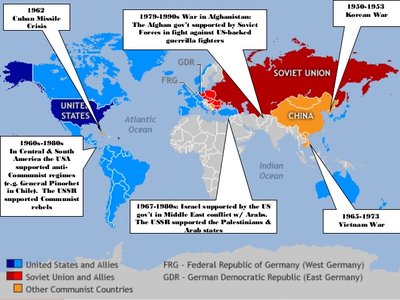

Stalin's Mistakes: some of Stalin's policies were flawed and increased Cold War divisions - The Berlin Blockade(1948-9) helped lead to the creation of a capitalist West Germany and the NATO military alliance. Abrupt end of Lend-Lease (1945) - Soviet exclusion from the Post-war administration of Japan. Stalin was suspicious of the West due to: - Western powers invading Russia in the Civil War (1917) - Allies delay to open up the second front in Europe during WWII. Personality: Insecurities, desire to dominate, and willingness to do anything to safeguard the Soviet Union. 5) Western initiatives, such as the introduction of a new currency in the Western Zones of Germany were viewed as provocative by soviet leaders, they saw them as an attempt to weaken the USSR. The US then perceived this as an attempt to spread the soviet's economic model as part of world communism. 4) The Marshall Plan was interpreted by the Kremlin as a calculated attempt to weaken soviet security interests. 3) Stalin's 1946 speech to the Supreme Soviet warnig of a possible future war against capitalism to justify introducing the 5 Year Plans was perceived to the US as a threat of war. Communism in China (1949)- the Soviet had limited support for Mao seeing him more as a rival than an ally. The US ignored evidence showing the Soviets actions were defensive not expansionist.

2) The US assumed the communist ideology, not security, was the driving force behind the Soviet's foreign policies. the Stalinisation of Eastern Europe was to safeguard the SU but the US interpreted it as a desire to dominate. Post-Revisionist 1) Stalin's defensive actions were seen as aggressive and expansionist.

This shows Russia's ongoing desire to increase their influence and territory. he was continuing Russians 19th Century policy of empire building. Stalin acted as a 'Red Tsar' by seeking to extend the soviets borders and influence. 4) Stalin's foreign policy was essentially a continuation of traditional expansionist objectives made by the Tsarist Empire not the global spreading of Communism. 2) US-Russian rivalry pre-dates to the 1917 Bolshevik Revolution, rivalry wasn't initially based on capitalism-communism differences but emerged due to both powers wanting to extend their political and economic influence into the same area (Asia) 3) Geographic inevitability: expansionism of US and Russian political and economic influence made conflict between the two powers unavoidable regardless of their ideologies. This is because Russia had been invaded in 1606, 1812, 1915, 19. 1) Soviet foreign policy was driven by a deeply ingrained traditional Russian sense of fear and insecurity, which encouraged defensive expansionism.


 0 kommentar(er)
0 kommentar(er)
